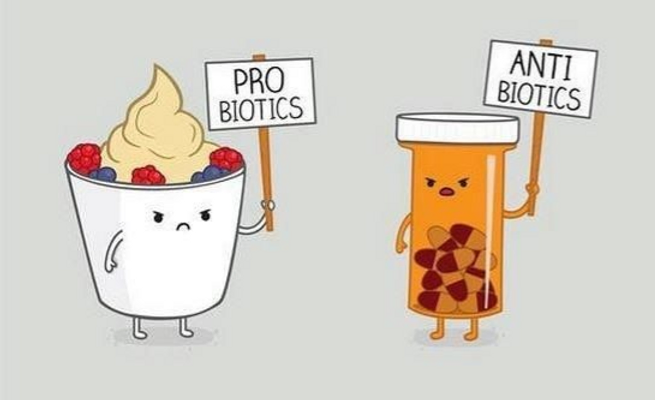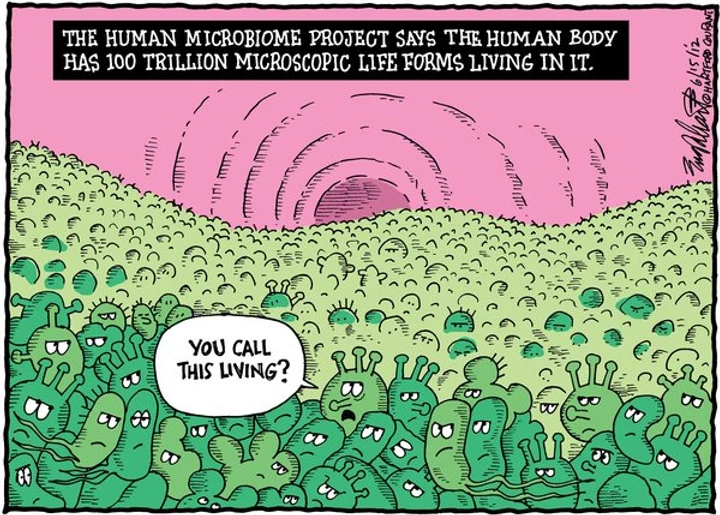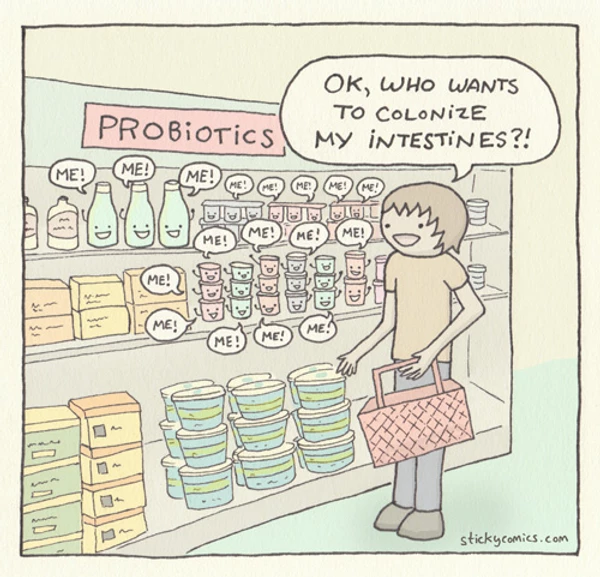You may have heard that our gut microbiome is important. In fact, it is a huge area of research right now. What exactly does that mean though, and why is it important?

Your gut consists of multiple different types of bacteria- some good, and some bad. A diversity of bacteria in your gut is most beneficial.
We start accumulating these little bacteria the day we are born, and they continue to change and function throughout our lives. These bacteria have many functions that range from digesting our food, extracting nutrients, and producing hormones. Think of them as helpful little bugs that each have their own job. You want a wide variety of jobs being done, and therefore a wide variety of bacteria in your gut.
The standard Western diet depletes the good bacteria and feeds the bad bacteria in our gut, messing with the balance of our microbiome. Processed foods, a lot of added sugar, unhealthy fats (saturated/trans/fractionated), and inflammatory foods are what contribute to this imbalance.
Food isn’t the only thing that kills our good bacteria. Overuse of antibiotics and over-the-counter medication are other contributing factors. Pesticide/chemical exposure and smoking are also believed to be good bacteria killers. We also tend to avoid dirt, which is rich in probiotics and healthy bacteria, which our ancestors did not do. 😆
Stress is another factor that influences your bacteria. Research has shown that high levels of stress can feed bad bacteria. Also, stress raises cortisol levels, which increases inflammation levels, which kills our microbiome.
All around, we are not doing much to support a healthy gut. We are slowly killing the little bugs that are working so hard to help us out.

Why should I care if my gut microbiome is balanced?
Nearly every aspect of your health is controlled by the bacteria in your gut and those hard-working little bugs. Our brain and our gut actually communicate, and if our bacteria is sending negative signals, it can even affect your mental health.
Bad bacteria can impact your brain’s production of serotonin, a hormone which controls your mood. It also affects other hormones that are associated with anxiety, depression, and stress.
Your body’s ability to fight illness is affected by your microbiota, because bad bacteria can feed pathogens that are responsible for viruses. Also, bad bacteria contributes to inflammation in the body, which can suppress your immune system and make it difficult to fight off bugs.
Research has shown that decline in gut health might be responsible for the increase in food allergies such as lactose and gluten.
Newer research has shown that neglected gut health might be responsible for weight gain as well. Individuals who are obese tend to have less microbiota living in their gut, and less of a variety. This means that a lot of those good bacteria’s jobs are being neglected. A deficit in good bacteria in the gut can make your body extract too much energy (calories) from your food. If your body is processing more energy than it needs, the excess gets stored as fat. There also seems to be a connection between low gut microbiota levels and sweet cravings.

So then what can you do to rebalance our microbiome?
Fixing your bacteria balance is fairly easy! Probiotics and prebiotics, two healthy bacterias, are found in many foods that can help replenish what you’ve lost so far:
- Fermented foods: like sauerkraut and kimchi.
- Kombucha: a fermented bubbly drink (like a healthier soda!)Kefir: similar to yogurt but with even more beneficial bacterias.
- Foods high in prebiotic fibre: onion, garlic, leeks, artichokes, jicama, green bananas.
- Healthy fats: avocado oil, olive oilEat a variety of foods, and be sure to include all colours of fruits and veggies! Each type of healthy bacteria can be found in different foods, so eating a wide variety ensures you’re receiving a wide range of nutrients. This is especially true for plant-based foods such as fruits and vegetables.
- High fibre foods, such as beans and legumes, help healthy bacteria grow.
- Eat organic: research has shown that pesticides can be harmful to microbiota.
- High polyphenol foods: antioxidants and polyphenol rich foods reduce inflammation and help good bacteria grow. Some examples of polyphenol rich foods are dark chocolate, red wine, green tea, almonds, and blueberries.
If you are unable to eat foods high in probiotics and prebiotics, there are also supplements available to provide you with these nutrients.
It is equally important to avoid too much of certain foods as it is to include the gut-healthy ones.
Here is what to avoid if possible:
- Too much added sugar & artificial sweeteners (everything in moderation).
- Processed foods.
- Refined carbohydrates (white bread, white pasta, muffins, cakes, white rice).
- Any foods you know that you are intolerant to or are unable to digest well.
- Exercise has also been shown to support a healthy gut, but so is rest! Be sure to let your body recover.
- Reducing stress is another important step to take in order to improve your gut health. As stated before, stress raises cortisol, which increases inflammation in the body. This can kill healthy bacteria in the gut.
Balancing your microbiome can help you feel better mentally and physically. It can help you lose weight, improve your immune system, and feel less stressed. Balance your bacteria and be a better you! As a Naturopathic Nutritionist, I can help you to THRIVE and not just SURVIVE! Find out how here.